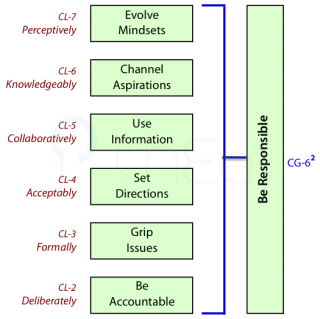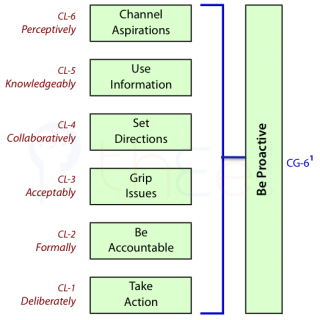Responsibility & Proactivity
and are not usually compared: however, they are similar in that they are both about and both are dependent on perceptiveness. Explore additional similarities and differences in the component here.
depends on personal factors like:
● General sense of obligation e.g. duty of care.
● Conscience i.e. sense of right and wrong.
● Integrity i.e. consistency between private and public values.
Its nature is to be found in , , and related phenomena: all located in the framework of .
depends on personal factors like:
● Intelligence e.g. reasoning and calculating causes and effects.
● Attunement i.e. sensing the situation and what is possible.
● Being innovative i.e. ability to generate new ideas and different solutions.
Its nature is to be found in the .
Unique Components
requires an active perceptive effort to adjust your own mindset and those of others in the light of deep changes in the nature of work, the organization or society. You must also perceive your own position to make an ethical choice. By contrast, must ignore such issues.

is based on the premise that deliberate action is essential and even urgent to deal with what is coming—i.e. taking action is the foundation of proactivity. By contrast, floats above action.
We can now consider the 5 levels that are shared, starting from below.
Common Components
CL2: Being Accountable
is based on deliberately accepting accountability in the widest possible sense.
By contrast:
recognizes accountability only as a formal requirement that shapes the handling of oneself and others in getting things done.
CL3: Gripping Issues
sees gripping issues as a formal matter related to recognition, clarification and reporting, without any necessary requirement for action.
By contrast,
leads to an involvement with issues that are perceived as generating difficulties in the future. These issues must be handled in an acceptable fashion to support whatever activity is being pursued.
CL4: Setting Direction

requires setting values and goals for self and others that are acceptable and therefore likely to be appreciated and used.
By contrast,
requires setting directions that affect others and require their prompt cooperation: so it must be done collaboratively.
CL5: Using Information
requires information to be used collaboratively because objectivity is needed to justify attention to whatever is being addressed.
By contrast,
seeks information to be knowledgeable about the situation so that deliberate action can be precise, timely and targeted.
CL6: Channeling Aspirations
requires being knowledgeable about aspirations so as to maintain a realistic appreciation of what drives people and therefore what can be expected from them.
By contrast,
requires sufficient perceptiveness about aspirations in order to carry people along with conviction when getting things done.
But cannot be demonstrated generally or according to whim—it must be focused. This focus comes from an agreement that reflects the mutual bond of obligation between management and employee. It is far more personally and socially important than the employment contract.
- Its THEE-name is the compact, constituted by the final heptadic grouping of all levels.
riginally posted: 11-Nov-2011